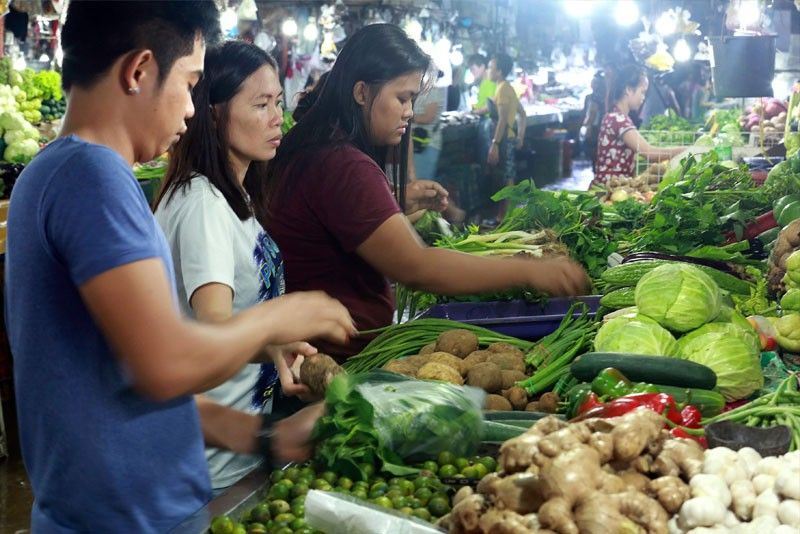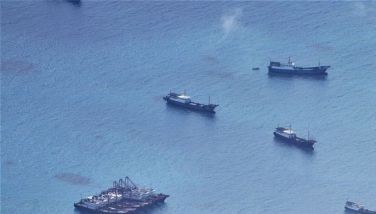Duterte complains of high airfares, food prices

MANILA, Philippines — President Duterte yesterday complained about high airfares in the country days after the Civil Aeronautics Board (CAB) approved the reimposition of fuel surcharges because of rising oil prices in the global market.
Duterte brought up the high airfares during a meeting with Cabinet members and local officials on the effects of Typhoon Ompong in Tuguegarao.
“By the way, the airfare, is it controlled by airlines? Are we controlling it? Which is which?” the President said.
Transportation Secretary Arthur Tugade replied that the airfares are determined by the CAB.
Duterte, who travels to Davao City during weekends, complained that airfares have become very costly. Tugade explained that the Philippines does not have its own fuel and has to import from other countries.
Energy Secretary Alfonso Cusi said about 50 percent of the Philippines’ energy needs is dependent on oil while the rest are from renewable and indigenous sources.
“We import oil so we are working on projects in the Philippine Rise and the West Philippine Sea for our oil sufficiency,” Cusi said.
Tugade said he has been crafting a matrix that would compare air fare charges with oil prices.
“We want it to be axiomatic. If the oil prices drop and you do not lower fares, you can be subjected to sanctions or penalty,” the transportation chief said.
Last week, the CAB approved the imposition of fuel surcharges, an act that was disallowed three years ago.
In a resolution, CAB said aviation fuel prices have risen to $85.16 per barrel as of April 2018 from $63.66 per barrel in the same period last year.
Because of the resolution, passengers of one-way domestic flights may have to pay P34 to P769 while passengers bound for other countries may have to pay P163 to P9,860 more, depending on the destination and jet fuel costs.
The applicable fuel surcharge would be determined based on the two-month average of jet fuel MOPS prices in its peso per liter equivalent, and would be fixed for two months, CAB said. There will be no fuel surcharge if the two-month price average of jet fuel per liter falls below P21.
In the same meeting, Duterte described as a “tragic development” the absence of a vessel that travels directly from Davao to Manila. He said many people from the province who are carrying food items are experiencing inconvenience because of the overcrowding in ships.
Tugade noted that the major component of food costs is transportation.
“Two things are being done: we provide refrigerated containers for use of farmers and fishermen to preserve their products... We also talk to shipping companies, if it is possible to impose special tariffs on perishable goods instead of tariffs dictated by the market. This can help reduce the costs of transporting goods which in turn will help lower prices in the market,” Tugade said.
Duterte then asked officials to continue searching for means to reduce the prices of food in the market.
‘Suspend TRAIN’
The Freedom from Debt Coalition has called for the suspension of Republic Act 10963 or the Tax Reform for Acceleration and Inclusion (TRAIN) law amid its “snowballing impact” on the prices of basic commodities and services.
FDC president Rene Ofreneo cited the “glaring effects of TRAIN on the economy,” with inflation breaching a nine-year high of 6.4 percent in August and the surge in the prices of basic food items, including rice.
“Why does the Duterte administration and its economic managers still consider the TRAIN law to be an indisputable success despite three quarters of proof that only its suspension can benefit the Filipino people,” Ofreneo said in a statement.
Ofreneo hit the administration’s economic managers, who he said should not escape accountability for their “extreme incompetence or outright callousness.”
He slammed the “band-aid measures” that the administration is looking to take, such as the Rice Tarrification law, or cut in tariffs for imported food items, instead of confronting the link of TRAIN and inflation.
He added that these counter-inflationary measures that the government is looking at will only worsen the country’s vulnerability to supply shocks in the long run.
“These counter-inflationary policy directions… reveal that our economic managers and legislators continue to treat inflation as a short-term problem with emergency palliatives,” he added.
The FDC said the government should instead activate the potential of the local economy, such as buying stocks of the National Food Authority from local palay farmers instead of importing. – With Romina Cabrera
- Latest
- Trending





























